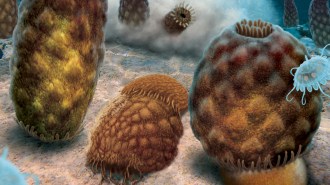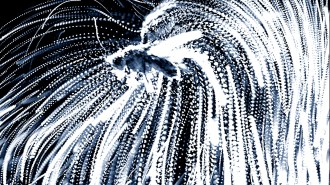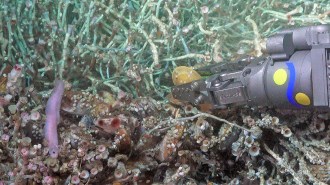News
-
 Astronomy
AstronomyThe mystery of Christiaan Huygens’ flawed telescopes may have been solved
The discovery of Saturn’s largest moon, Titan, may have come despite its discoverer, Christiaan Huygens, needing eyeglasses.
-
 Paleontology
Paleontology310-million-year-old fossil blobs might not be jellyfish after all
An ancient animal called Essexella may have been a type of burrowing sea anemone, a new study proposes.
By Meghan Rosen -
 Climate
ClimateBy flying over atmospheric rivers, scientists aim to improve forecasts
Drenching atmospheric rivers are slamming the U.S. West Coast, bringing needed water but dangerous flooding. Here’s how scientists study these storms.
-
 Agriculture
AgricultureMartian soil may have all the nutrients rice needs
Experiments hint that in the future, we might be able to grow the staple food in the soils of the Red Planet.
By Nikk Ogasa -
 Earth
EarthEarth’s inner core may be more complex than researchers thought
Seismic waves suggest that Earth has a hidden heart, a distinct region within the solid part of the planet’s core.
-
 Physics
PhysicsStatic electricity helps parasitic nematodes glom onto victims
The small electric charge generated by a moving insect is enough to affect the trajectory of a parasitic nematode’s leap so it lands right on its host.
-
 Health & Medicine
Health & MedicineMaternal deaths in the U.S. keep climbing
New U.S. data show that as maternal deaths rise, a large gap between the maternal mortality rate of Black women compared with white women persists.
-
 Planetary Science
Planetary ScienceA volcano on Venus was spotted erupting in decades-old images
A new look at old data reveals an eruption on Venus in the 1990s that was probably similar to Hawaii’s Kilauea eruption in 2018.
-
 Earth
EarthA moon-forming cataclysm could have also triggered Earth’s plate tectonics
Deeply buried remnants of a hypothetical planet that slammed into Earth 4.5 billion years ago might have set subduction into motion.
By Nikk Ogasa -
 Animals
AnimalsA ‘fire wolf’ fish could expand what we know about one unusual deep-sea ecosystem
Unlike other known methane seeps, Jacó Scar is slightly warmer than the surrounding water and is a home for both cold-loving and heat-loving organisms.
-
 Genetics
GeneticsWhy experts recommend ditching racial labels in genetic studies
Racial labels don’t explain biological and genetic diversity but do cause stigma. They belong “in the dustbin of history,” a panel of experts says.
-
 Tech
TechA trick inspired by Hansel and Gretel could help rovers explore other worlds
Taking a cue from a classic fairy tale, scientists propose a way for rovers to send back data from treacherous terrain.